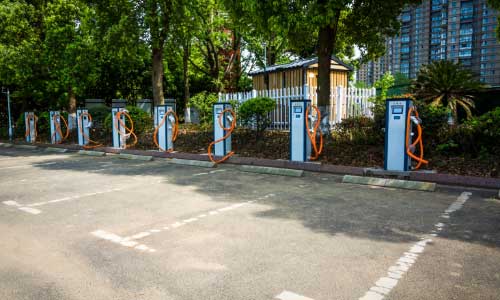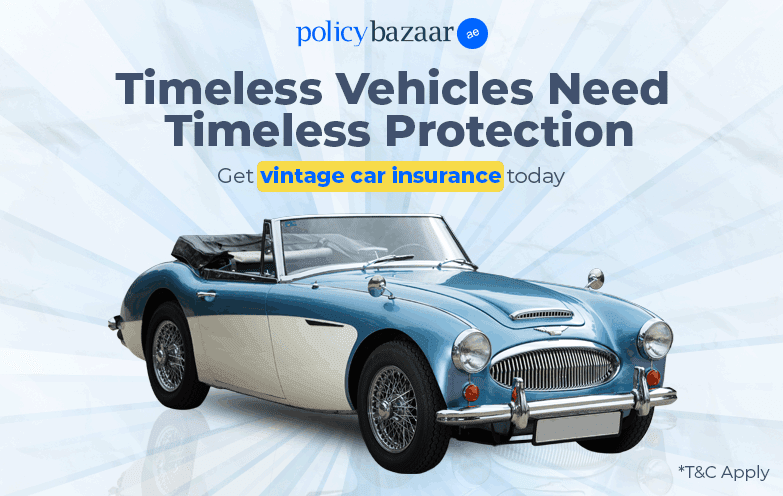Best Car Insurance in UAE
Some of the best and the cheapest car insurance quotes in Dubai are:
If Dubai could be known for only one thing, it would be the awe-inspiring love its people have for beautiful luxury cars. From the latest sports car to the rarest of the vintage, antiques and classics, there is a well-enough chance that you will get to see shining beauty on a normal day-out in the UAE. Although, owning a car comes with responsibilities, even more so if it is a high-value luxury vehicle. Modern cars are easy to own, get repaired and insured, as evident. The problem begins when you are a proud owner of a 30-year-old vintage and looking for a proper classic car insurance plan. To make your search a little smoother, let’s discuss everything there is to about classic cars and their insurance.
Vintage, Antique or Classic – What is the Qualification?
Before you go ahead and worry about finding a proper car insurance plan, try to figure out whether your car qualifies as a vintage model or a classic model. As a rule, cars that were manufactured between the years 1919 and 1930 are classified as vintage cars. The cars that were manufactured before 1975 (or more than 45 years old) are known as antique cars. Finally, cars manufactured before 1990 (more than 20 years old) are known as classic cars.
In the case of collectable cars, if the “value” of the car now exceeds its market price, it is classified as a collectable car. This category can include cars from vintage, antiques as well as classic categories. These classifications are used in generic terms. It often happens that insurance providers sometimes classify cars according to their maintenance requirements, services, etc. This means you will often find classic car insurance plans also extending covers to antique cars.
What are Classic Car Insurance Plans?
Classic car insurance plans are just like the general car insurance plans available for modern cars. They offer protective financial support for your classic car. The insurance coverage includes damages from collisions, accidents, natural disasters, man-made disasters, theft, etc. Consider an antique car insurance plan as a generic comprehensive car insurance plan for old, collectable cars.

Are There Different Plans for Vintage, Classic and Antique Cars?
Technically, vintage, antique and classic cars are three different categories of collectable cars. However, insurance companies do not necessarily offer insurance plans according to the same categorisation. Some providers offer the same kind of insurance plans and benefits to all high-value luxury vehicles. This includes modern luxury cars as well as old collectable cars. A few providers also work on an age-based system. For example, if your collectable car is more than 30 years old, it can be insured with a classic car insurance plan or vintage car insurance. The terms are often used interchangeably as well. So, more often than not, a vintage car insurance plan and a classic car insurance plan could mean the same thing.
Types of Cars Covered under Classic Car Insurance
Given following is a list of possible types of cars that an antique car insurance plan can cover. Although, this list can be different for each insurance provider according to the services they have.
- Antique cars
- Vintage cars
- Classic cars
- Muscle cars
- Restored cars
- Replicas of vintage or antique cars – older than 20 years
- Customs car models and classic military vehicles
Why Do You Need Classic Car Insurance?
If you are a classic car enthusiast, you must already be aware of the incredible value these cars hold and the amount of care they need. The sheer maintenance can cause a huge toll on the owner. Not to mention, if something unfortunate were to happen to a precious collectable, you may end up losing a fortune along with your vintage car.
A proper classic car insurance plan can help you ensure that your classic or vintage car is not only properly taken care of but also retains its performance and beauty. On top of that, owning a lavish vintage car means that you are going to drive it at some point. Taking a car on the road exposes you to all kinds of accident and collision-related risks. An antique car insurance plan would cover your vehicle against all the potential risks.

What are the Common Inclusions of Classic Car Insurance?
A comprehensive vintage car insurance plan can come with several benefits and services. Given following are the most common basic benefits:
- Third-party liability expenses – for both vehicular and personal damages/injuries
- Collision protection from accidental damages caused by any kind of collision or accident. It includes protection against damages caused by man-made and natural disasters as well.
- Personal injury cover – may come as an add-on benefit from some providers
- Uninsured or under insured motorist cover – there is a possibility that a vehicle without an insurance plan crashes into your luxury vintage car. Here, your insurance companies cover the damage and the injuries caused by the accident. This also applies if the insurance plan of the third party has a low assured sum limit and cannot cover the damage completely for a luxury car.
Add-ons of a Classic Car Insurance Plan
- Spare parts restoration cover
- Salvage Cover – cover that allows keeping part(s) of a salvaged totalled vintage car.
- Under-construction vehicle cover
- Accessories cover – include vintage accessories like license plates, ornaments, and other collectable items in the car
- Roadside assistance cover
- Auto show medical reimbursement – could be an add-on cover for some providers
- On display cover – against damage occurred when your car is on display
Factors Affecting Classic Car Insurance Price
Just like with any car insurance plan out there, several factors can affect the price of your antique car insurance plan. Given below are the top factors that affect the price of a classic car insurance premium:
Value of the Vintage Car
The higher the value of your car, the higher is the insurance price going to be. High-end, expensive cars are a bigger risk for insurance companies to take on. They will have to compensate the insurance holder as per the value of the totalled car if there is a total loss situation. Not to mention, the spare parts of an expensive car are equally expensive and so is the maintenance and mechanic charges.
Age of the Car
The age of the car works oppositely in the case of vintage cars. Where normal automobiles lose their value as they get older, vintage cars gain value. So, the older your car, the more valuable of an antique it is going to be. Although, the algorithm to determine the premium amount of a classic car insurance plan based on age can differ for each provider.
Maintenance Cost Estimate
The average maintenance cost of your car is also considered when calculating the premium amount of your classic car insurance plan. Maintenance is going to cost more if the mechanics who are skilled with the working of a particular model are rare to find. Along with that, if the car has been driven a lot, maintenance increases proportionately. Insurance companies send out car inspectors to estimate monthly average maintenance as per the condition of the car.
Availability of Spare Parts
This is the biggest challenge that vintage vehicles face in everyday life – unavailability or shortage of spare parts. Since vintage and all other kinds of cars covered by antique car insurance are rare and expensive themselves, it is hard to procure spare parts. Many owners even choose to keep salvaged spare parts from their totalled vintage cars as antique souvenirs. So, the more difficult it is to find spare parts for vintage cars, the higher its premium is going to be.
What is the Pay-Out Like if the Car is Totalled?
The general rule of a car insurance plan states that the policyholder will receive a compensation amount equal to the market value of the car. The market value of a car decreases as it gets old. However, it is not the same case with vintage cars. The value of vintage cars works on a reverse timeline. The older the car is, the higher its value. This makes the concept of market value is obsolete in the case of a vintage car.
So, insurance companies hold discussion sessions with the owner to decide on an “agreed value” for their vintage car. This agreed value becomes the assured amount for your vintage car insurance plan which is what you get as compensation in case of total loss. Some insurance providers may also base their pay-outs for total loss on the “stated value” of the car. Many providers may also offer compensation based on whichever amount turns to be cheaper for them – stated value or agreed.
Deciding the Value of Your Vintage Car
- Stated Value: You can simply state the current value that your vintage car hold and supports it with documented proof. You can simply get a valuation certificate made for your vintage car to support the agreed value. A value inspector will assess the vehicle to determine its current worth according to age and other factors and provide you with a certificate. This documented value becomes the stated value of the car.
- Agreed Value: Several factors can contribute to the decision-making process for the agreed value of your vintage car. You can also show appreciations that your vintage car has received, the rarity of the spare parts, photographed proof from exhibitions and collections, and some documented proofs. If your car is a model that tends to maintain its current value or increase it as time passes, agreed value is the right choice to go with when taking a classic insurance plan.
Conclusion
A gorgeous vintage car is every owner’s pride. So, a comprehensive vintage car insurance plan is required to ensure their complete safety and proper maintenance. When buying a classic car insurance plan, make sure that you check all the benefits properly, take good add-ons and get the insurance company to agree on the authentic agreed value for the car. There can be several guidelines and eligibility conditions for taking an antique car insurance plan differing for each provider. Make sure you have a proper discussion to understand the conditions and then proceed with complete information.
More From Car Insurance
- Recent Articles
- Popular Articles















